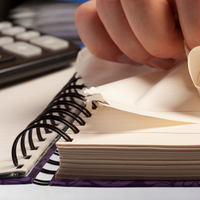Chances are you’ve been in this exact situation – you’re studying the day before an important test when you realize that your own notes aren’t clear. You scramble to reread the chapter, then you call a friend, and then you try to recall each lecture. Panic ensues. In other words, sometimes you walk into an exam with incomplete knowledge – all because of your poor note-taking.
Consider these five tips for taking better math notes to help make your math studies more accurate and efficient. You may also want to take a look these tips to help you organize your notes.
Use an audio recorder
Most smartphones now have the capability to record audio (assuming you are allowed to use your phone in class). If you aren’t allowed to use your phone, work out an arrangement with your instructor so that you can use another recording device. You may be able to find one that is compatible with your headphones or car stereo so you can listen to notes while walking or driving to class. This can help you find extra study time.
Audio recordings can also serve as a safety net. If your notes aren’t clear on a topic, you can simply listen to that particular class lecture again. However, you can’t solely rely on audio because math is a very visual subject. Audio recordings should not replace your current study habits.
Handwrite your notes
Some students believe that they can type faster than they can write, which helps them take more accurate notes. However, to truly understand math, you must be able to see charts and graphs, and to work out problems step by step. These functions are difficult to quickly perform on a computer. Instead, fill your notebook with problems, formulas, graphs, pictures, and charts so you have more information to better understand concepts.
Research also suggests that handwriting your notes is more effective. Students who write their notes by hand may better understand how to apply concepts.
When you handwrite notes, you can’t record every single word, so you must summarize and quickly grasp the most important pieces of information. This may also ultimately help you better remember class content. You may also want to take a look at these free math resoources.
Record every step of every problem
Assume nothing. Just because you can remember all the steps in a given problem during class does not mean that you’ll remember them when studying, especially if your test is a few weeks away. Leave ample white space in your notes so that you can write down all the steps for every problem. This may seem tedious, but it could be another safety net for you when you’re studying.
Record any exceptions
Different numbers behave differently in a given formula. For example, how does a formula change if it’s a negative number, or a decimal point instead of a fraction? Adding information about rules and exceptions may help you take better math notes, and it may improve your math knowledge overall.
It’s thus important to have these rules and exceptions in your notes. Get in the habit of constantly asking your teachers if there are any exceptions to the formula, or if different numbers require different steps.
Review extra problems at home
This step may help you discover any exceptions that were not reviewed in class. You can then ask your teacher or professor about these odd cases during your next lecture, and you can record them in your notes. The more exceptions you take note of, the more you may be able to limit the number of surprise questions you see on test day. If you still find yourself struggling you could consider working with a math tutor as well.
There is no great mystery behind taking better math notes. Ensuring you have a safety net through audio recordings, handwritten notes, and knowledge of exceptions may help you better retain information and improve your performance in math. You may also want to take a look at these tips which can help you take notes in any college lecture. Why not try these five tips for taking better math notes in your next class?

